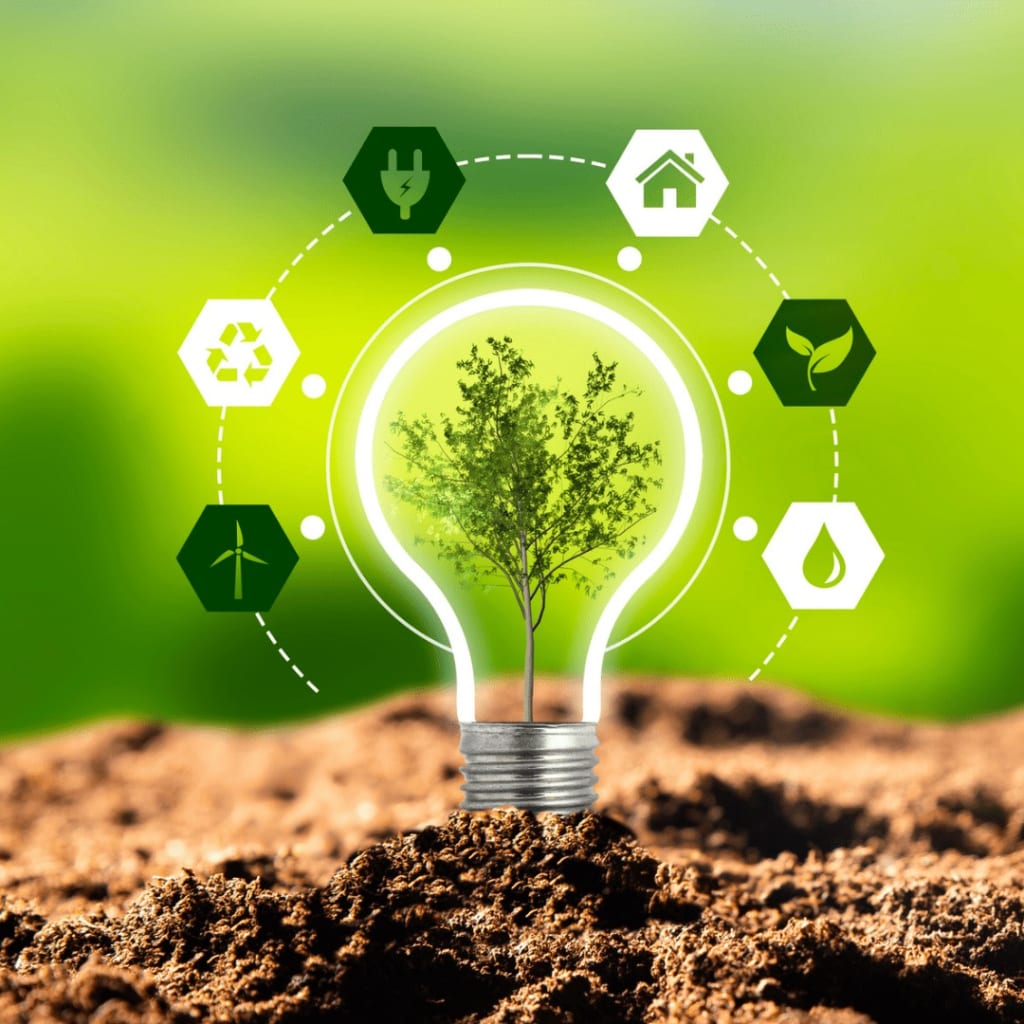Biotechnology and Environmental Sustainability: Innovative Solutions for a Greener Future
Harnessing Nature's Power to Protect Our Planet

In today's world, the pressing need for environmental sustainability is more critical than ever. But what exactly does this mean, and how can biotechnology play a pivotal role in achieving it? At its core, biotechnology harnesses the power of living organisms and biological systems to develop innovative solutions for various industries. From agriculture to waste management, biotechnology is making significant strides toward a greener, more sustainable future.
The Role of Biotechnology in Agriculture
Genetically Modified Crops
One of the most well-known applications of biotechnology is in the development of genetically modified (GM) crops. These crops are engineered to possess desirable traits such as increased yield, pest resistance, and enhanced nutritional content. By improving crop resilience, biotechnology helps farmers produce more food on less land, reducing the strain on natural resources.
Pest and Disease Resistance
Biotechnology enables the creation of crops that are resistant to pests and diseases, significantly reducing the need for chemical pesticides. This not only lowers the environmental impact of agriculture but also promotes healthier ecosystems by preserving beneficial insects and reducing soil and water contamination.
Drought and Salinity Tolerance
With climate change intensifying, water scarcity and soil salinity are becoming major challenges for agriculture. Biotechnological advancements have led to the development of crops that can thrive in arid and saline conditions, ensuring food security in regions prone to these environmental stresses.
Enhance your learning experience with dedicated biotechnology assignment help, designed to improve your knowledge and grades through expert tutoring and resources.
Biotechnology in Waste Management
Biodegradation
Biotechnology offers promising solutions for waste management through biodegradation. By using microorganisms to break down organic waste, biotechnology can convert waste into valuable byproducts such as compost and bioenergy, minimizing landfill usage and reducing environmental pollution.
Wastewater Treatment
Advanced biotechnological methods are employed in wastewater treatment to remove contaminants and purify water. Biological treatments, including the use of bacteria and algae, effectively degrade harmful substances, making water safe for reuse and reducing the burden on freshwater resources.
Recycling of Industrial Waste
Industries generate vast amounts of waste, much of which can be recycled using biotechnological processes. By employing microbes and enzymes, industrial waste can be transformed into reusable materials, thereby reducing the environmental footprint of manufacturing processes.
Renewable Energy through Biotechnology
Biofuels
Biofuels, derived from organic matter, are a sustainable alternative to fossil fuels. Biotechnology plays a crucial role in the production of bioethanol and biodiesel from crops, algae, and even waste materials, offering a renewable and cleaner energy source.
Biogas
Biogas production is another exciting area where biotechnology shines. Through the anaerobic digestion of organic waste, biogas is produced, which can be used for heating, electricity, and even as a vehicle fuel. This process not only generates energy but also reduces greenhouse gas emissions.
Algal Bioenergy
Algae, often referred to as the "green gold," have immense potential in bioenergy production. Biotechnology enables the cultivation and harvesting of algae for biofuel, providing a high-yield and sustainable energy source that doesn't compete with food crops for land.
Biotechnology in Conservation Efforts
Restoration of Degraded Ecosystems
Biotechnology is instrumental in the restoration of degraded ecosystems. By using bioremediation techniques, pollutants are removed from soil and water, rehabilitating natural habitats and promoting biodiversity.
Conservation of Endangered Species
Conservation biotechnologies, such as cloning and genetic banking, are employed to preserve endangered species. These techniques ensure the survival of species that are on the brink of extinction, maintaining ecological balance.
Bioremediation
Bioremediation involves using microorganisms to clean up contaminated environments. This technology is particularly effective in treating oil spills, heavy metal contamination, and other hazardous pollutants, restoring ecosystems to their natural state.
Industrial Biotechnology
Green Manufacturing Processes
Biotechnology is revolutionizing manufacturing by introducing green processes that minimize waste and reduce environmental impact. Enzymes and microorganisms are used to produce chemicals, pharmaceuticals, and other products in an eco-friendly manner.
Sustainable Materials
The development of biodegradable plastics and other sustainable materials is another significant achievement of industrial biotechnology. These materials offer an alternative to conventional plastics, reducing pollution and conserving resources.
Reducing Carbon Footprint
Industries are increasingly adopting biotechnological solutions to lower their carbon footprint. From carbon capture and storage to the production of carbon-neutral products, biotechnology is helping industries transition to more sustainable practices.
Biotechnology and Climate Change Mitigation
Carbon Sequestration
Biotechnology provides tools for enhancing carbon sequestration, the process of capturing and storing atmospheric carbon dioxide. Through genetic engineering, plants and microorganisms can be optimized to absorb and store more carbon, mitigating climate change.
Greenhouse Gas Reduction
The reduction of greenhouse gas emissions is a critical goal in combating climate change. Biotechnological innovations, such as methane-reducing feed additives for livestock and bioenergy production, contribute to lowering these emissions.
Climate-Resilient Crops
Developing climate-resilient crops through biotechnology ensures that agriculture can withstand extreme weather conditions. These crops are designed to thrive in varying climates, securing food production in the face of climate change.
Advancements in Biotechnology
CRISPR and Gene Editing
CRISPR and other gene-editing technologies are revolutionizing biotechnology by allowing precise modifications to DNA. These advancements enable the creation of crops with enhanced traits and the development of innovative solutions for environmental challenges.
Synthetic Biology
Synthetic biology combines engineering principles with biology to design and construct new biological entities. This field holds immense potential for creating sustainable products and processes, from biofuels to biodegradable materials.
Precision Agriculture
Precision agriculture utilizes biotechnological tools to optimize farming practices. By integrating data analytics, sensors, and genetic information, farmers can make informed decisions that enhance productivity and sustainability.
Challenges and Ethical Considerations
Public Perception and Acceptance
Despite the benefits of biotechnology, public perception and acceptance remain challenges. Education and transparent communication are essential to address misconceptions and build trust in biotechnological solutions.
Regulatory Hurdles
The regulatory landscape for biotechnology can be complex and varied across regions. Navigating these regulations is crucial for the successful implementation of biotechnological innovations.
Ethical Concerns
Ethical considerations, such as the potential impacts on biodiversity and the long-term effects of genetic modifications, must be carefully weighed. Responsible practices and ethical frameworks are necessary to ensure the sustainability of biotechnological advancements.
Case Studies
Success Stories in Agricultural Biotechnology
Examples of successful agricultural biotechnology projects include the development of Bt cotton, which significantly reduces pesticide use, and Golden Rice, which addresses vitamin A deficiency.
Innovations in Waste Management
Innovative waste management solutions, such as the use of genetically engineered microbes for plastic degradation, showcase the potential of biotechnology to tackle environmental issues.
Renewable Energy Projects
Projects like the cultivation of algae for biofuel production and the use of agricultural residues for biogas illustrate the transformative impact of biotechnology on renewable energy.
Future Prospects
Emerging Technologies
Emerging biotechnologies, such as gene drives and synthetic biology, hold promise for further advancing environmental sustainability. Continued research and development will unlock new possibilities.
Potential Impacts
The potential impacts of biotechnology on environmental sustainability are vast, from enhancing food security to reducing pollution and mitigating climate change.
Global Collaboration
Global collaboration is essential to maximize the benefits of biotechnology. Sharing knowledge, resources, and technologies will enable countries to address environmental challenges more effectively.
Conclusion
Biotechnology offers innovative solutions for achieving environmental sustainability. By harnessing the power of living organisms, we can develop sustainable agricultural practices, manage waste more effectively, produce renewable energy, and mitigate the impacts of climate change. As we continue to advance biotechnological research and address challenges, we move closer to a greener, more sustainable future.
FAQs
- What is the main goal of biotechnology in environmental sustainability?
- The main goal is to use biological processes and organisms to develop sustainable solutions that reduce environmental impact, enhance resource efficiency, and promote ecological balance.
- How does biotechnology help in waste management?
- Biotechnology aids in waste management by employing microorganisms to biodegrade organic waste, purify wastewater, and recycle industrial waste into useful byproducts.
- What are the benefits of biofuels over traditional fuels?
- Biofuels are renewable, produce fewer greenhouse gas emissions, and reduce dependence on fossil fuels, contributing to a cleaner and more sustainable energy future.
- Can biotechnology help mitigate climate change?
- Yes, biotechnology can mitigate climate change by enhancing carbon sequestration, reducing greenhouse gas emissions, and developing climate-resilient crops.
- What are the ethical considerations in using biotechnology for environmental purposes?
- Ethical considerations include the potential impacts on biodiversity, the long-term effects of genetic modifications, and ensuring responsible and equitable use of biotechnological innovations.
About the Creator
jamesstone
Hello, I am James Stone, an academic writer at New Assignment Help. With extensive experience, I create high-quality content to support students. Our assignment help services include essays, research papers tailored to your academic needs.
Enjoyed the story? Support the Creator.
Subscribe for free to receive all their stories in your feed. You could also pledge your support or give them a one-off tip, letting them know you appreciate their work.






Comments
There are no comments for this story
Be the first to respond and start the conversation.